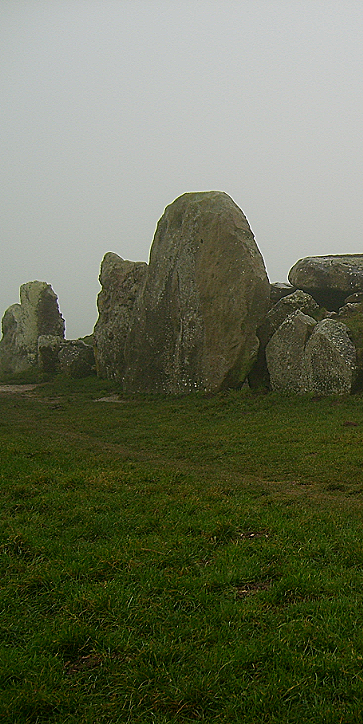
 |
West Kennet Long Barrow |
||
| August 21, 1992 |
||
On a cold day in late September with occasional showers of rain, I was pretty much alone on the A4 highway driving from Marlborough towards Devizes in Wiltshire, England. I passed the small sign marking West Kennet Long Barrow and had to double back. A little red brick farmhouse sat right beside the road, and next to it a turnout large enough for perhaps four cars. A metal gate led to a footpath that curved around the farmhouse and into the empty fields beyond to disappear over a low hill. As I entered the gate a white goat in the farmyard eyed me with wary curiosity. The only other creature in sight was a man on a green tractor far, far across the golden fields harvesting the grain. Once the path entered the fields, fencing ran on both sides to keep the tourists from getting in the farmers’ way. It seemed to go for miles, most of it a steady incline, but the guide book reassured me it only traversed a half mile. I couldn’t see anything remotely resembling a Neolithic barrow, just more hill and more. I began to wonder how such an invisible thing could possibly be as impressive as I'd been led to believe. Then I noticed a section of uncultivated field pop over the horizon, autumnal wild grass and field flowers that, I guessed, the farmer had missed. But only one long snake of field was overgrown, and as I drew nearer I saw a little track of fencing around it. As if the sight of the fence conjured them, the stones appeared, popping over the top of the hill. I’d expected something grander, I thought, with starker, more clearly delineated stones. Certainly the pictures I’d seen of the barrow had been dramatic. They seemed dinky as I climbed towards them—but I was still a victim of perspective. I climbed and the barrow grew longer, larger. When I finally arrived, the gray-brown guarding stones of the entrance seemed massive. I spent a long time there, standing on top of the barrow while the chill soaked through my exertion and turned my cheeks slowly numb. A little path ran along the top where God knows how many tourists had trod before, marking out the one hundred meter length of barrow with their soles, wearing away the grass until the white chalk of Wiltshire showed through the top soil. About mid-point the barrow dipped as if it had sunk or collapsed, then rose again before an undramatic end merging with the hillside. Little white flowers grew in tufts here and there on the barrow and beside it. I started back towards the entrance. I thought of the ancient people who had been buried here, glad I had time to be alone with my thoughts and with the place. I entered the tomb. The light dimmed inside, fed only from the entrance. One long rock chamber went back about twenty feet before ending in a wall. Four alcoves fed off the main chamber, and on a stony shelf in the last of these alcoves, someone had laid some of the wildflowers from the top of the barrow. I thought I understood this act of veneration, for I felt it too—reverence and regret for the bones that had slept here for countless generations, and now sat on the shelf of a museum in Devizes. I felt something else, too—or thought I did: the presence of the ancestors in this place, something deep, fundamental, quiet as the earth beneath my feet. The stones fairly vibrated with presence. I touched them to reassure myself it was only imagination that vibrated in that place. Cold, silent, solid stone, but also something that defied logic, something tiny and barely perceptible, not even strong enough to qualify as a vibration. Maybe just the stones breathing, maybe just the earth spinning on its axis. Or maybe, I thought with a stubborn realization, the blood in my veins singing to my own ancestors in recognition. I laughed at myself, but the feeling persisted, undeniable, and it filled me with joy. "Endorphins," said the logical side of my brain, but I laughed at it, too. Defied it. I went back outside and took a deep breath. The chill sank in all the way to my toes, but I hardly noticed. I was really sailing high, spinning out on a line of exhilaration grounded in the earth, but stretched out at its limit. I hoped in that a moment that the line would break so I could go sailing up through the black rain clouds and never, ever come down. |
||
Copyright © 2010 P.J. Thompson |